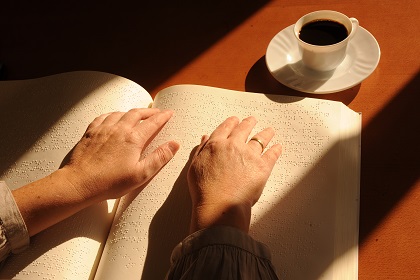Silo’s words that framed our project to sensitise sighted people to the group of blind people marginalised by our society:
“When you do something for others, when you look for the needy, the disoriented, the dispossessed and help them to get what they need, guide them or give them what they need, you are doing something worthy. That is the way, to dedicate your energy to be useful to others, it goes towards the needy and the poor, without forgetting yourself of course, that is worthy work.
And if I am consistent with that universal moral standard, I cannot treat others in a way that I would not like to be treated; I cannot treat the humble, the destitute, the exploited, the marginalised, I cannot treat them differently from the way I would like to be treated. To treat others the way I want to be treated is to go towards others the way I would want others to help me. And if I want the help of others, I must help others!
Silo, meeting with humanists from Tacna, Arequipa, Lima and Arica on 26 January 1997.
Back in 1986 we met the Spanish National Organisation of the Blind (ONCE), a public service corporation self-managed and run solely by blind people.
With the profits of their Lottery, they take care of the needs of blind people from a very early age and finance their education, basic, secondary and higher education of all blind people in the country and also give them work and solve tiflotechnical (adapted utensils) and tiflological (science that studies blindness and its cure) issues as well as facilitating the use of books and relief maps.
In 1991 we visited Silo to tell him about the project to help the blind, he told us: “you blind people are the outcasts of the outcasts and we have to accept it because that’s the way it is” and he laughed, which took away the seriousness of the matter.
We took this initial text and what we had discussed with Silo as a framework, we saw that our action should be directed towards the most disadvantaged and we approached them in order to fulfil what we had proposed. We put the message into practice in this way, bringing to the marginalised what they need.
Blind people are a group of people who, if they are not properly cared for, remain in the most absolute marginalisation, which is what is currently happening in all ambits of society, without exception.
In 2009 in Parque Toledo we were preparing to start the Leveling and Disciplines. Several blind people expressed their interest in participating, but we realised then that, within the humanist ambit, the treatment of these people did not differ from the treatment they received in the social environment. We got ONCE to transcribe the material for blind applicants but they forbade us to make it public because of intellectual property. So, we called the teachers of Parque Toledo and created a group that voluntarily recorded all the necessary materials. As of 2018 we continued recording and it took us 4 years to record Silo’s complete written work, which was distributed to all the Parks of Study and Reflection in the World.
Most of the world’s population has good eyesight, yet “they do not see blind people” have in-vi-si-bi-li-za-ed them.
Nowadays the blind population are subjects of charity and they themselves have become accustomed to it. In reality, however, they are subjects of rights. For this reason, we have launched the Unification of the Blind of Chile and through a social movement we intend to ask the government for a Lottery that will give a response to all the material needs that this group needs and thus recover their dignity as human beings.
There is a great future for the human family.






